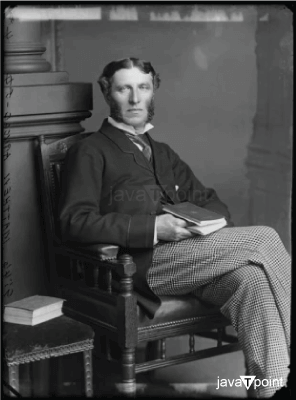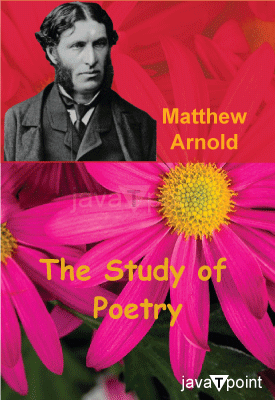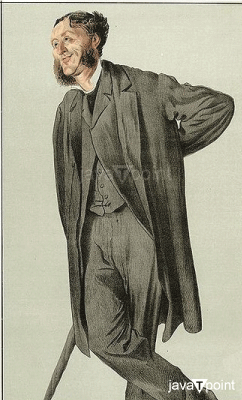The Study of Poetry by Matthew ArnoldIn "The Study of Poetry," which Mathew Arnold wrote as the preference to an anthology titled The English Poets in 1880, Mathew clarifies his responses to what he saw to be the most crucial problems facing literacy critics and readers: what purpose does poetry serve in contemporary society? How can readers learn to spot classic poetry when they encounter it, and what separates truly exceptional poetry from simply decent poetry? Readers can infer from Arnold's queries and his responses that his primary tenet regarding culture and society is that transcendent beauty exists, poetry is the place where it can be found, and people should make an effort to honor it. In essence, Arnold argues that poetry is a particularly good art form and that, because of its merits, it has a "high destiny" in human affairs. Only the finest standards will do because this destiny touches on human beings' highest desires, and readers must educate themselves to uphold standards. Arnold advises readers to perform this task in order to advance themselves. 
Note: First published as the general introduction to T.H. Ward's anthology, The English Poets (1880), The Study of Poetry is the first piece in the 1888 volume. The ideas due to which Arnold got the fame are mentioned in it. In a time when creeds are falling apart, poetry will have to act as religion.Our need on poetry to "interpret life for us, to comfort us, and to sustain us" will grow. In order to do this, we must immerse ourselves in the work of acknowledged masters and use passages that demonstrate their "high seriousness," as well as their superiority of diction and movement, as "touchstones." We also need to be able to tell the best poetry from the bad, as well as the real from the fake. In order to better grasp the critical work of learning to recognize the outstanding elements in poetry, Arnold begins by defining the true assessment of poems worth. It has to be noted that, Arnold's argument holds that a given poem has a single true worth that can be exactly assessed. This real estimate can be discovered by first identifying two misleading estimations. The historic estimate and the personal estimate are the terms that are commonly used to describe incorrect estimates, while the real estimate is used to describe the true estimate. Arnold maintains that only the real estimate can accurately determine a poem's worth; he also insists that only the real estimate can determine whether or not a poem belongs to the highest echelon of poetry. Arnold holds that the only valid reason to read poetry is to engage with the best works that humanity has to offer. 
On the other side, a poem's historical estimation derives from its significance as a historical artefact; for instance, this estimation is connected to the poem's role in the evolution of a language, a literary movement, or other historical events. Whatever benefits this historical estimate may have, Arnold makes it apparent that it must be distinguished from the true estimate, which is timeless. Similar to the historic estimate, Arnold believes that the personal estimate must be separated from the types of considerations that lead to the true estimate of a poem. This estimate is based on the reader's like and dislikes and is related to their own interests and preferences. Robert Burns, a Scottish poet whose works are typically cherished by the Scottish people but fall short of the pinnacle of greatness in a larger sense, is used as an example by Arnold. 
So what determines the true assessment of a poem's worth, and how does a reader arrive at such assessment? Arnold mentions a crucial quality that distinguished poems of the highest value in addition to the traditional poetic attributes of beauty, rhythm, and creativity that readers must learn to recognize. This is what he refers to as extreme seriousness. Aristotle, who favored poetry over history because of its "higher truth and a higher seriousness," is where Arnold gets the idea for "high seriousness." The definition Arnold gives of this high seriousness is a little hazy, but it is evident from the example he uses from Dante Alighieri's Divine Comedy that it entails treating the most significant issues- such as fate and free will-with the gravity of a poet who truly understands the significance of such themes. The way a poet approaches such issues is referred to by Arnold as "critique of life." Arnold argues that the life criticism in Chaucer's or Dryden's work is less profoundly serious than that of Dante, Homer, Shakespeare, or Milton. Arnold explains that the only way to determine a poem's true worth is to regularly evaluate it against the works of great poets, a process he illustrates in his article. Arnold believed that poetry of the first rank is only comparable to the creative excellence and high seriousness of works by Dante, Homer, Shakespeare, and Milton, if not, Arnold believed that it is not likely to be worth putting much time into it. In his final paragraph, Arnold reiterates his opening statement: "Poetry's "high destiny" in human affairs will ensure that it never fades or perishes, and even if it occasionally appears that society is turning away from poetry, this is only temporary because people always turn to poetry in times of great need. Analysis of Mathew's StudyThe extensive citation from a prior article by Mathew Arnold (this time, an introduction to the book The Hundred Greatest Men) demonstrates two crucial aspects of his worldview. First, Arnold is focused with the notion that people need support and comfort in their lives now, and he is utterly confident that poetry can do it. More than that, he is persuaded that poetry will deliver it by necessity. Second, Arnold views his time as one in which traditions and faith are eroding. As a result, he believes that poetry is necessary, and that there should be more focus on how to read poetry correctly and benefit from it. Both of these presumptions show Arnold's fundamental belief that the time he was writing in was a period of decline marked by disillusionment and falling standards. Arnold's attitude towards his time, which is that of a man committed to protect the idea of "the very best," which he sees in poetry, amid an age of skepticism, may be used to explain much of his reasoning and tone. It is also significant that Arnold chose to quote himself at the beginning of his essay, as doing otherwise would have been an act of false modesty given that he somewhat represents the ideals he wants his readers to uphold. After recognizing that it is a little weird to start an article with a quote from oneself, Matthew Arnold emphasizes that readers must keep in mind that poetry could play a significant role in the rapidly altering social landscape in everything that follows. Everything Arnold would discuss in "The Study of Poetry"can be attributed to poetry's preeminent status in his worldview. The goal of the anthology that "The Study of Poetry" is meant to introduce, which is to enable readers to analyses the evolution of English poetry, is the next topic Arnold discusses. In order to convey to readers how he views poetry- as a powerful, unstoppable force that is always moving forward into the future and the property of all humankind- Arnold utilizes the metaphor of a large river (a "world-river") nourished by the tributaries of national poetic traditions. This is important because some of the poets Arnold would mention as examples of the best poetic art are not English classics but rather figures from their poetic traditions. Arnold concludes by emphasizing that while this anthology is devoted to English poetry, all poetry, regardless of country origin, must adhere to the same criteria. As a result, Arnold's perspective on poetry is grounded in a wholly global (albeit Eurocentric) philosophy of art. 
It is stated that when Arnold died, the critic was born; and it is true that he began to write nearly exclusively is prose at this point. Early versions of several of the key concepts and expressions cab be found in Culture and Anarchy and Essays in Criticism (First Series, 1865; Second Series, 1888). "The Function of Criticism at the Present Time," the opening essay in the 1865 collection, is an introduction introducing most of the issues he discussed more efficiently in later writing. It is immediately clear that he attributes "criticism" with a scope and importance never before imagined. According to him, the goal of criticism is to "establish a current of true and new ideas" by disseminating the greatest information that is currently known and believed in the world. He is actually attempting to cultivate a spirit, one that plays with not jus "literature" but also theology, history, art, physics, sociology, and politics, and in each of these fields seeks "to see the object as I itself it really is." |
 For Videos Join Our Youtube Channel: Join Now
For Videos Join Our Youtube Channel: Join Now
Feedback
- Send your Feedback to [email protected]
Help Others, Please Share









